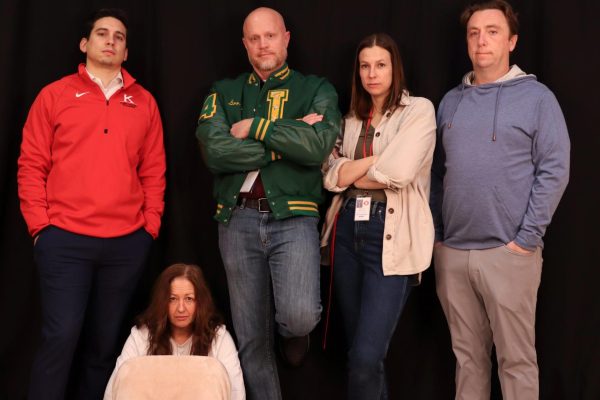‘Now he can’t hurt us anymore’
Lesley Sexton, sophomore, and her mother, Lois Sexton, open up about the domestic violence they suffered to raise awareness and offer hope to those who suffer abuse.
“He had me in the basement, and he had nailed a board up in the rafters and was standing there with a rope. He told me that I could put the rope around my neck and jump off the chair, or he would put the rope around my neck and push me off the chair. Whichever way I decided, I would not be breathing ‘his air’ when the sun came up in the morning.”
Night and day, the father of Lesley Sexton, sophomore, kept her and her mother, Lois Sexton, locked inside their house and would not allow them to use a phone to communicate with family or friends. It was during this time Lois endured a nightly beating from her husband throughout their 13 years of marriage, starting out as slaps and punches but progressively getting worse.
“I would go and try to find my mom in the house because I knew if there wasn’t any noise, then [the beating] had stopped,” Lesley said.
Lois said she was able to escape from the basement and make it upstairs. However, she soon found herself face-down on the couch with her husband’s hands around her throat. His knees pushed against her back, and Lois heard her ribs begin to crack and break.
“[The abuse] was physical. It was emotional. It was financial. It was sexual. I mean, you name it,” Lois said.
Lesley said her mom suffered the most abuse. Lesley was between 5 and 6-years-old when the abuse first occurred, making the situation between her mother and father was hard to comprehend. He mentally abused Lesley by changi ng the way she thought about different aspects of her life, making it seem like a game.
“He would leave and take her to school in the morning and [Lesley] would say, ‘Now remember, Mommy, you’re not supposed to talk to anybody. Don’t use the phone,’ because she thought it was a game,” Lois said.
Tom Gaither-Ganim, KHS support counselor, said victims of domestic abuse will often feel shame, guilt and embarrassment because the abuser blames their actions on the victim.
“For grown women [who] are abused by their husbands, some might feel or think that she did something to deserve it,” Gaither-Ganim said. “Sometimes that could be the case with kids, too.”
Lois remembers her husband using eight or nine four-inch wooden screws which he screwed into the front door, locking her and Lesley in.
Lois said during her marriage she lived in survival mode. According to Gaither-Ganim, survival mode involves the victim having a constant fear of not knowing when they will be violated.
“[They] have to map out their day to either try to avoid that person or prepare for [the abuse] happening,” Gaither-Ganim said. “It’s always there looming over their consciousness.”
While the nightly beatings were happening, Lois was not allowed to raise her voice or object to anything her husband said or did; it was against his rules, and it put her and Lesley in danger if Lois challenged him.
One morning, 6-year-old Lesley tip-toed into her mother and father’s bedroom, complaining to her mother she was hungry. Lois slipped out of bed and walked her daughter out of the room to make her breakfast.
However, as Lois walked her daughter to the kitchen she noticed the front door was not screwed shut. She guessed he forgot to screw shut the door because the night before Lois received her worst beating since she was married to her husband.
Lois grabbed the car keys and drove away with Lesley before he could notice. She knew if they did not leave the beatings would have gotten worse. They then took a flight to Lois’s sister’s home in North Carolina on December 14, 2002, and stayed for two-and-a-half weeks. Lois’s sister, Lisa, confirmed their escape from home and their stay at her home in North Carolina.
During those two-and-a-half weeks, Lesley’s father unexpectedly passed away. It was only then that Lesley and Lois returned to St. Louis to plan his funeral.
Lesley and Lois fought for their lives and now they sit hand-in-hand laughing and crying together about life. Lesley and Lois said the experience brought them closer.
“Now [Dad] can’t hurt us anymore,” Lesley said to her mom after learning of her father’s death.
Lesley said this experience has opened her eyes to police regulations toward those affected by domestic violence. The police would come and talk to Lois in a different room, leaving Lesley alone with her father.
“[The police] go into a house where they suspect domestic violence happening and could handle the situation better instead of [leaving me with my dad],” Lesley said.
Lois stated in a written piece about her abuse to Mercy Hospital, “Today my daughter and I are safe and happy. She is my hero for waking me up that cold but hopeful morning. She saved us both.”
If you or a loved one has been domestically abused, call the National Domestic Violence Hotline at 1-(800)-(799)-(7233) where those affected by domestic violence receive support, safety planning and hope.
Your donation will support the student journalists of Kirkwood High School. Your contribution will allow us to purchase equipment and cover our annual website hosting costs.

Grade: 12
Extracurricular: Call, Band, Brass Band, 2015 Vice President, NHS, work at Custard Station, CC Captain, Swim and Dive team, Quill and Scroll
What...

Grade: 12
Extracurriculars: XC, Track, Band, French Club, NHS, Call, NAHS, Quill and Scroll
What do you like about Call?: The shenanigans
How...













Lois • Apr 24, 2013 at 9:34 am
Thanks for sharing our story. Bridget, you did a great job. DV is not an easy topic to talk about; nobody wants to think that it can happen to them or deny that it is happening to them. Lesley and I are some of the lucky ones for getting out when we did. Be on the lookout for red flags: controlling behavior, name calling, pushing, shoving, and/or hitting in your SO’s behavior. For those that are in a dangerous relationship, there is hope and happiness after DV, you just have to take that first step out the door. Is it scary? Yes! Turn to people that can help. There is a better life out there. Go get it!